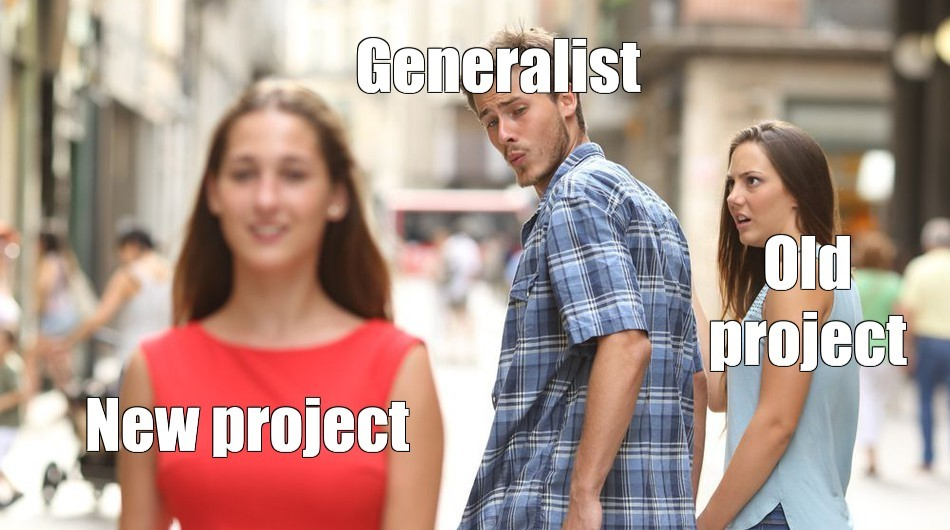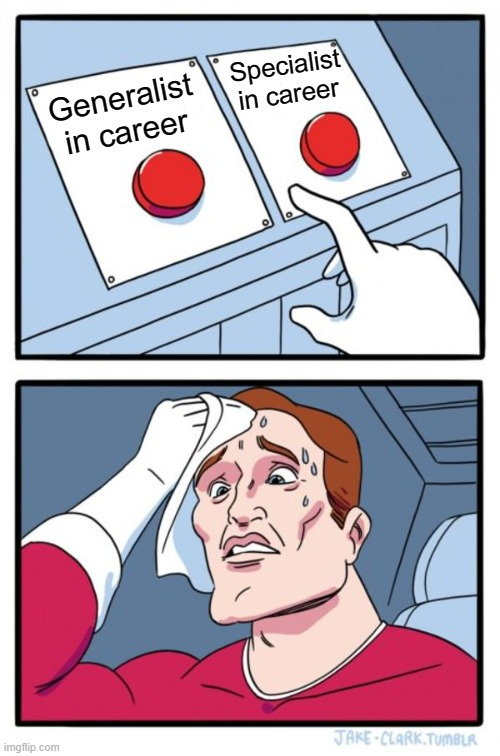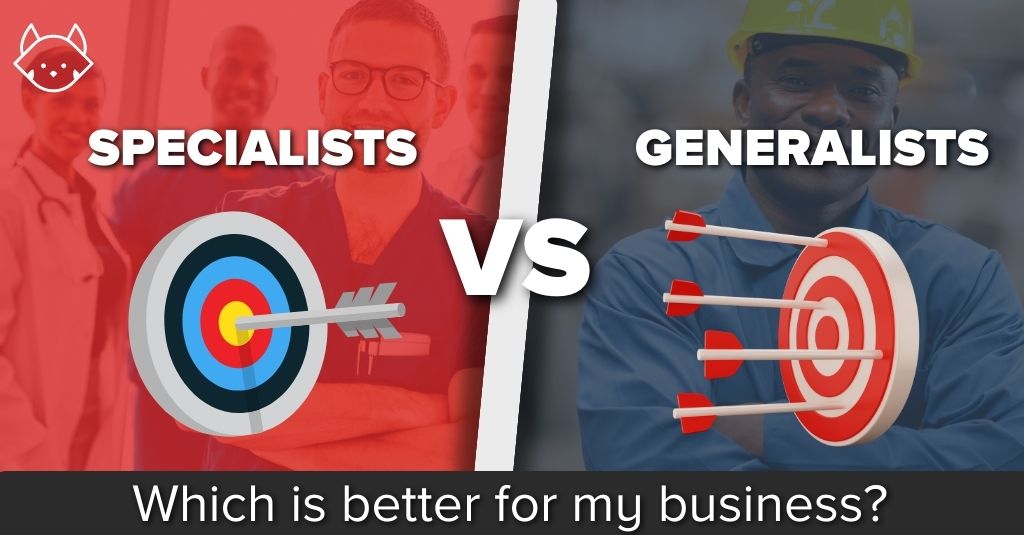When it comes to building a successful team, one of the biggest decisions that managers and business owners face is whether to hire generalists or specialists. On one hand, generalists are versatile employees who can take on a wide range of tasks and responsibilities. On the other hand, specialists are experts in a specific area and can bring a deep level of knowledge and skill to the table. So, which approach is the right one for your business?
In this blog post, we’ll take a closer look at the pros and cons of hiring generalists versus specialists and explore the different factors to consider when making your decision. Whether you’re looking to fill a new position, or simply want to better understand the strengths and weaknesses of your current team, this post will provide valuable insights and guidance.
In particular, we’re going to be covering:
Pros and Cons of Hiring a Generalist

Generalists are employees who have a wide range of skills and can perform a variety of tasks. They are often considered to be “jack-of-all-trades” and can handle multiple projects at once. This type of employee is best suited for companies that have a diverse range of needs and require someone who can wear many hats.
The pros of hiring a generalist are:
- Versatility
- Flexibility
- Cost-effective
- Good for small teams
The cons of hiring a generalist are:
- Lack of depth
- Limited focus
- Lack of specialised knowledge
- More supervision needed
Let’s delve into each of these.
Pros
Versatility

Generalists are able to take on a wide range of tasks and responsibilities, which makes them valuable assets to any team. This means that they can easily adapt to different projects and can work on multiple assignments at the same time. This ultimately means that the team can be more agile and responsive to changing business needs.
Flexibility
Generalists can quickly switch between different roles and projects, making them ideal for businesses that are constantly evolving and changing. They can take on different roles and responsibilities, which can be a huge help when businesses are expanding or changing direction. This flexibility can also help teams to manage workloads more effectively, ensuring that projects are completed on time and to a high standard.
Cost-effective
If you choose to go down the specialist route, you’re going to need to hire multiple specialists. This is going to take time and be resource heavy.
For example, let’s say you are a small consulting firm, and you need help with research, report writing, and client consulting. You invest time and money into recruiting a specialist for research, a specialist for report writing and a specialist for client consultations. This can become quite costly.
On the other hand, hiring a generalist is far more cost effective. In the same example above, a generalist can take care of all three tasks; report writing, research and client consultations. This cost-effective solution allows you to save money on the recruitment process and on the hire of two team members.
Good for small teams
For small teams, generalists can be a good option as they can handle multiple tasks and responsibilities, which can be a huge help when there are limited resources.
They can help to fill in the gaps in a team, providing support and assistance where it is needed most. This can help small teams to be more productive and efficient and can help to keep costs down.
Cons
Lack of depth
One of the downsides of hiring a generalist is that they may not have the same level of expertise or knowledge as specialists. This can lead to a lack of depth in certain areas, which can be a problem if you need someone who is an expert in a specific field.
This is especially true in cases where you need a specific job done, and when you need it done especially well. Let’s face it – the generalist is never going to be able to do the job as well as a specialist would. Sometimes, this isn’t an issue. But sometimes, it is. The problem is that when it is an issue, it’s a big one!
Let’s imagine you are a small graphic design agency, and you are looking to hire someone to handle your clients’ design needs. You have two candidates, one is a generalist with some experience in graphic design, Facebook ads, and video editing; and the other is a specialist who is an expert in design.
The generalist may be able to do a little bit of everything, but they don’t have the same level of expertise in graphic design as the specialist. This means they’re likely less proficient in creating high-quality designs and may not have the same level of understanding of design principles, which can lead to designs that don’t meet the agency’s standards. This will reflect poorly on your agency and result in an unhappy customer.
Limited focus
With a generalist, you may not get the same level of focus as you would with a specialist, as they have a wide range of skills and responsibilities. This can make it harder for them to fully concentrate on one specific task or project as they’re called to handle multiple responsibilities requiring differing skill sets. This ultimately can lead to less efficiency and lower quality of work.
Let’s look at an example. For a small landscaping business in need of a new team member to handle their clients’ gardening and maintenance needs, they decide to hire a generalist who can take on a variety of tasks like planting, mowing, pruning, and irrigation system maintenance.
The generalist may be able to handle the planting, mowing, and pruning tasks, but they may not have the same level of expertise in irrigation systems as a specialist.
This means they may not be as proficient in maintaining and troubleshooting irrigation systems, which can lead to issues like wasted water and damaged plants.
Lack of specialised knowledge
Generalists may not have the same level of specialised knowledge as specialists, which can lead to a lack of understanding of certain industry-specific concepts and requirements. This can make it harder for them to fully understand and meet the needs of your business or customers. How would this impact your business?
Let’s say you own a design and advertising agency, and you need to create a new brochure for a client. A specialist who focuses on design will likely produce a great result. However, a generalist, whose sole focus isn’t design, is less likely to produce a brochure that matches up to the standard of the specialist’s brochure.
Having a lack of specialised knowledge makes a big difference in the service that someone can provide.
More supervision needed
Generalists may require more supervision than specialists, as they may need guidance in certain areas where they lack specialty expertise. In saying that, the best generalists tend to be the operators of the team, with strong interpersonal skills. Ultimately, the less technical the role is, the more likely it is that the generalist will not need supervision.
Pros and Cons of Hiring a Specialist

Specialists are employees who have a deep understanding of a specific skill or area of expertise. They are considered to be experts in their field and are highly skilled in one particular area.
This type of employee is best suited for companies that have specific needs or projects that require a high level of expertise.
Some of the pros of hiring a specialist include:
- Deep expertise
- Industry specific knowledge
- Cost-effective in the long run
Some of the cons of hiring a generalist include:
- Limited versatility
- Higher cost
- Limited ability to adapt to changing needs
Pros
Deep expertise
Specialists have a deep level of expertise in a specific area. This means they have a high level of knowledge and skill in their field, which can result in high-quality work and better results for your business.
For example, if you are a small accounting firm, hiring a specialist in tax preparation will give you an expert who can specifically help your clients save more money on their taxes.
Industry-specific knowledge
Specialists have specialised knowledge in their field, which can be invaluable in certain industries. For example, a specialist in a specific field such as healthcare or legal will have a greater understanding of industry-specific regulations and requirements, which can be crucial to providing high-quality service and staying compliant with industry standards.
Cost-effective in the long run
Hiring a specialist in the long term will be more cost effective. For example, a specialist software developer can help a company come off inefficient and outdated systems by creating better and more efficient software. Although it will cost more to hire the specialist software developer at first, the new systems will help save time and money in the long run.
Cons
Limited versatility
Specialists are experts in one specific area, which means they may not be as versatile as generalists. They may not be able to take on multiple roles and responsibilities as easily, which can be a problem if your business needs someone who can adapt to different projects or changing business needs.
For example, a specialist who is an expert in web development may not be able to handle other tasks such as graphic design and search engine optimization. This can limit the capacity of a web design team to take on more diverse projects and can be a problem if the agency needs someone who can adapt to different projects or changing business needs.
Higher cost
Specialist roles come with a cost, so be mindful of this when working with a tight budget. Specialists often require higher salaries and compensation packages than generalists as their fields require extensive study and/or experience.
Limited ability to adapt to changing needs
Specialists may have limited ability to adapt to changes in their field or changes in business needs. They may not be able to easily switch to different roles or projects, which can be a problem if your business needs someone who can adapt to different projects or changing business needs.
For example, a newspaper advertiser may have found it difficult to adapt when social media advertising and google ads were introduced. Making that shift would have been difficult, because it’s a completely new skill, and for a specialist whose laser-focused on one area, this can present major challenges.
Should You Hire a Specialist or a Generalist?

If you’ve read this far, you know that there are advantages and disadvantages to hiring both generalists and specialists. However, knowing this may make it even harder to choose which to hire for your business. So, what’s the best way to decide whether to hire a specialist or a generalist?
Well, it really depends on the specific needs of your business and the role you’re trying to fill. If you need an expert in a certain field, like tax preparation for an accounting firm, then a specialist is probably the way to go. But, if you need someone who can take on multiple roles and responsibilities, like a jack-of-all-trades for a small startup, then a generalist would be a better fit.
In addition, as a business owner, you should also consider the future needs of your business. For example, if you see yourself expanding your business and taking it in a new direction in the future, it might be wise to hire a generalist who can adapt to the new challenges and changes. On the other hand, if you see yourself focusing on a particular niche and staying in the same direction, then hiring a specialist might be the way to go.

When considering whether to hire a generalist or a specialist, you should also consider factors such as:
- The specific skills and experience required for the role. More specific requirements will mean a specialist is needed.
- The size and structure of your team. If you have a large team you may not have responsibilities available in varying areas, so a specialist might be best. On the other hand, in a smaller team you may need each person to wear more than one hat, which would require a generalist.
- Your budget and resources. A lower budget means you will have to go with a generalist, or alternatively a specialist with less experience. A higher budget means you have the ability to choose between the two.
- The level of supervision and guidance that the role requires. If you want to supervise less, it’s probably better to hire a specialist, and vice versa.
It’s important to weigh the pros and cons of hiring a generalist versus a specialist, and to consider the specific needs of your business before making a decision.
It’s also worth noting that you can also hire a combination of both generalists and specialists, each with their own strengths, to work together to achieve the best results for your business.
So, what’s next?
So, to wrap it up, whether you go for a generalist or a specialist really depends on what your business needs. Specialists have a ton of knowledge in one specific area, but a generalist can handle multiple tasks. It’s all about finding the right fit for your business. So, weigh the pros and cons, think about your current and future needs, and make your decision based on what’s best for your business.
If you were interested in this article, you might like some of these:













